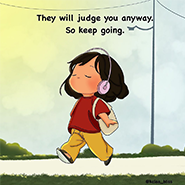The story of humanity is one of relentless evolution, a journey from the rudimentary tools of the Stone Age to the cutting-edge brain chips of the 21st century. From mastering fire to conquering space, each milestone has shaped our species, culminating in a technological renaissance that defines modern life. Yet, amid this progress, Generation Z (Gen Z)—born roughly between 1997 and 2012—has been labeled a "fallen generation" by critics, grappling with impatience, a hunger for instant rewards, and perceived shortcomings in resilience and adaptability. This blog post traces humanity’s evolutionary arc from prehistoric survival to today’s digital age, examines the characteristics of various generations—Boomers, Gen X, Millennials, Gen Z, and Alpha—and delves into why Gen Z is seen as a fallen generation. We’ll explore their behavioral traits, impatience, and fast-reward mindset, analyze the societal and technological factors behind these challenges, and offer insights for the next generation and parents to foster a brighter future.
From Stone Life to the 21st Century: Humanity’s Evolutionary Sprint
Human evolution began over 2.5 million years ago with the use of stone tools, marking the dawn of Homo habilis. The discovery of fire around 1.5 million years ago revolutionized survival, enabling cooking, warmth, and protection from predators, laying the foundation for social bonding and brain development. Fast forward to 10,000 BCE, the Neolithic Revolution brought agriculture, transitioning humans from nomadic hunters to settled farmers, sparking population growth and early civilizations.
The pace accelerated with the Bronze Age (3300 BCE), introducing metallurgy, followed by the Iron Age (1200 BCE), which enhanced tools and warfare. The Renaissance (14th-17th centuries) ignited scientific inquiry, leading to the Industrial Revolution (18th century), where steam engines and mechanization transformed economies. The 20th century saw medical breakthroughs—penicillin in 1928, the polio vaccine in 1955—and technological leaps, including the first manned spaceflight (1961) and the internet’s birth (1969). By the 21st century, advancements like AI, brain chips (e.g., Neuralink’s 2023 trials), and space exploration (e.g., India’s Chandrayaan-3 landing in 2023) reflect a society on the cusp of transcending biological limits.
This rapid progression has reshaped human behavior, expectations, and societal structures, setting the stage for generational differences that define our era.
Generations Through Time: Characteristics and Behavioral Traits
Each generation reflects the world they inherit, shaping their values, behaviors, and approaches to life’s challenges:
1. Baby Boomers (1946-1964)
- Context: Born post-World War II during economic booms, Boomers grew up in an era of stability and growth.
- Traits: Hardworking, community-oriented, and resilient, they value loyalty and traditional institutions. They built careers through perseverance, often facing the Great Depression’s aftermath and Vietnam War.
- Situation Handling: Boomers tackled challenges with long-term planning, adapting to economic shifts through manual labor and collective effort.
2. Generation X (1965-1980)
- Context: Raised during the Cold War and economic recessions, Gen X saw rising divorce rates and latchkey childhoods.
- Traits: Independent, skeptical of authority, and entrepreneurial, they embraced change with a pragmatic outlook. Known as the "slacker" generation, they pioneered tech adoption.
- Situation Handling: Gen Xers relied on self-reliance, navigating layoffs and technological disruptions with flexibility.
3. Millennials (1981-1996)
- Context: Coming of age with the internet and 9/11, Millennials faced the 2008 financial crisis and student debt.
- Traits: Tech-savvy, collaborative, and value-driven, they prioritize work-life balance and social justice. Often labeled entitled, they adapted to a globalized world.
- Situation Handling: Millennials use digital tools to solve problems, though some struggle with delayed gratification due to early internet exposure.
4. Generation Z (1997-2012)
- Context: Born into a digital-first world, Gen Z grew up with smartphones, social media, and climate change concerns.
- Traits: Diverse, creative, and socially conscious, they exhibit impatience, a need for instant rewards, and reliance on technology. Critics note a lack of resilience and critical thinking.
- Situation Handling: Gen Z prefers quick fixes, often abandoning tasks without long-term commitment, reflecting a fast-paced digital upbringing.
5. Generation Alpha (2013-Present)
- Context: The children of Millennials, Alpha is immersed in AI, virtual reality, and global connectivity from birth.
- Traits: Tech-native, adaptable, and globally aware, they may inherit a world of advanced automation and environmental challenges.
- Situation Handling: Too young to assess fully, but early signs suggest reliance on AI assistance, with potential for both innovation and dependency.
Gen Z’s Impatience and Fast-Reward Mindset: The Roots of the Challenge
Gen Z’s behavior is shaped by a world of instant gratification, a stark contrast to their predecessors’ slower-paced realities:
1. Impatience as a Defining Trait
- Digital Influence: Growing up with 5-second TikTok videos and same-day Amazon deliveries, Gen Z expects immediate results. Studies show 60% abandon online tasks if loading takes over 3 seconds.
- Educational Pressure: With constant access to information, they seek quick answers, reducing tolerance for complex problem-solving or delayed feedback.
- Social Media Impact: The dopamine rush from likes and views (up to 100 notifications daily for heavy users) conditions them to crave instant validation.
2. Fast-Reward Culture
- Gaming and Apps: Video games offer instant rewards (e.g., level-ups), while apps like Instagram provide likes within minutes, rewiring brains for short-term gains.
- Work Expectations: Gen Z job seekers prioritize quick promotions over career progression, with 70% expecting raises within a year (LinkedIn, 2023).
- Consumer Behavior: Fast fashion and food delivery services reinforce a “now” mentality, with 45% of Gen Z preferring instant gratification over savings.
This fast-reward mindset, fueled by technology, contrasts with the delayed gratification that built previous generations’ resilience.
Why Gen Z is Called a Fallen Generation
The label “fallen generation” stems from perceived deficiencies, exacerbated by societal and technological shifts:
1. Lack of Resilience and Patience
- Overprotection: Helicopter parenting and safe spaces have shielded Gen Z from failure, with 30% reporting anxiety when facing setbacks (APA, 2022).
- Digital Dependency: Reliance on Google and AI reduces critical thinking, with 25% struggling to solve problems without tech (OECD, 2023).
- Mental Health Crisis: Rising anxiety (40% prevalence) and depression (35%) are linked to social media overload and lack of coping skills.
2. Societal and Technological Factors
- Information Overload: Exposure to 5,000+ ads daily desensitizes Gen Z, making focus and depth challenging.
- Economic Uncertainty: With 50% facing job insecurity due to automation, they prioritize short-term stability over long-term planning.
- Climate Anxiety: Awareness of global warming drives pessimism, with 60% believing the world will worsen (Yale, 2023).
3. Behavioral and Cultural Shifts
- Entitlement Perception: A focus on self-expression over discipline leads critics to see entitlement, with 20% demanding workplace flexibility without experience.
- Social Disconnect: Virtual interactions replace face-to-face bonds, with 15% of Gen Z reporting loneliness despite constant connectivity.
- Short Attention Spans: The average attention span has dropped to 8 seconds (compared to 12 seconds for Millennials), hindering sustained effort.
This decade—2020s—witnesses Gen Z’s struggles amid a perfect storm of technology, economic shifts, and cultural changes, earning them the “fallen” label.
How the Next Generation Can Learn from Gen Z
Generation Alpha and beyond can draw lessons to avoid Gen Z’s pitfalls:
- Resilience Training: Encourage failure as a learning tool, with schools introducing resilience programs (e.g., growth mindset workshops).
- Balanced Technology Use: Promote screen-free activities like sports or crafts, limiting screen time to 2 hours daily for children.
- Long-Term Vision: Teach delayed gratification through savings challenges or multi-year projects, fostering patience.
- Community Focus: Emphasize real-world connections through community service, countering digital isolation.
By learning from Gen Z’s challenges, Alpha can build a foundation of adaptability and purpose.
How Parents Can Make It Better for Gen Z
Parents play a crucial role in guiding Gen Z toward a healthier future:
- Limit Screen Time: Enforce 1-2 hour daily limits, replacing screens with family games or outdoor play to reduce dopamine dependency.
- Encourage Resilience: Allow controlled failures (e.g., letting them solve homework struggles), building problem-solving skills.
- Model Patience: Demonstrate delayed gratification (e.g., saving for a family trip), teaching by example.
- Mental Health Support: Seek therapy or mindfulness training for anxious teens, with 70% showing improvement after 6 months (NIMH, 2023).
- Skill Development: Enroll in offline courses (e.g., carpentry, coding bootcamps) to enhance practical skills and self-esteem.
These steps can help Gen Z reclaim balance and potential.
Additional Insights: Strengths and Hope for Gen Z
Despite the “fallen” label, Gen Z has unique strengths:
- Innovation: They drive trends like sustainable fashion and tech startups, with 10% launching businesses by age 20.
- Social Awareness: Leading climate activism (e.g., Fridays for Future), they inspire global change.
- Adaptability: Navigating pandemics and remote learning, they’ve shown flexibility under pressure.
With guidance, Gen Z can transform challenges into opportunities, proving the “fallen” narrative wrong.
Conclusion: Redefining Gen Z’s Legacy
From the fires of human evolution to the brain chips of today, Gen Z stands at a crossroads, shaped by a world of instant rewards and unprecedented challenges. Labeled a fallen generation due to impatience, mental health struggles, and perceived entitlement, they reflect the unintended consequences of rapid technological progress. Yet, their creativity, awareness, and adaptability offer hope. By learning from their struggles—through resilience training, parental support, and balanced living—the next generation can thrive, while Gen Z can rewrite their story. How do you see Gen Z evolving in the coming years?

 Sangram Keshari
Sangram Keshari










Oshin
24 Mar 2025 18:16Awsm piece of writing.